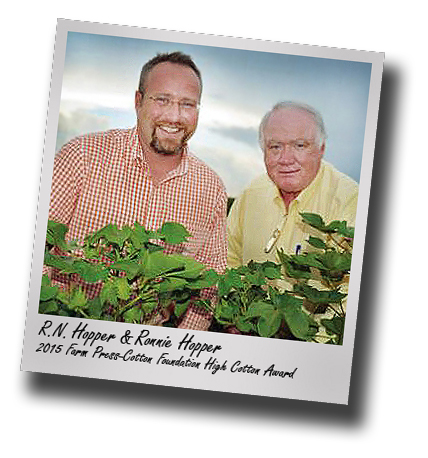PSS alums named 'Farm Press-Cotton Foundation High Cotton Award' winners

Two graduates of Texas Tech's College of Agricultural Sciences and Natural Resources are among recipients of the 2015 Farm Press-Cotton Foundation High Cotton Awards. Petersburg farmer Ronnie Hopper (BS, 1969; Agronomy) and his son, R.N. Hopper (BS, 2000; Agronomy) were honored at a breakfast this week at the Beltwide Cotton Conference in San Antonio, coordinated by the National Cotton Council.
The High Cotton Awards were initiated by Farm Press and the cotton council more than two decades ago to demonstrate that cotton growers and their families are concerned about the environment. The program is supported by a grant to The Cotton Foundation from Farm Press Publications.
"The High Cotton Award winners are some of the best cotton producers in the nation," said Greg Frey, Farm Press Publications' publisher. "But they also do their utmost to protect the land, air and water. They represent the very best in environmental stewardship."
The Hoppers told the crowd that change is constant on the farm operation. In 2006, the Hopper's farm grew mostly continuous cotton and has since shifted to a rotation of corn, wheat, and sometimes sunflower and peas. The operation went 100 percent no till in 2008 to conserve water, soil, and other components.
The Hoppers believe in no-till crop production, and predict it will gain acceptance across the Texas High Plains as farmers deal with the increasingly serious challenge of a declining water resource. Reasons for no-till cotton production include soil and water conservation, energy and labor savings, and replacing organic matter in the soil.
The thing that makes it work, they say, is crop rotation. "The success of no-till cotton relies on rotation," Ronnie said. Technology, including herbicide-resistant crops, improvements in planting and spray equipment, and better varieties "allowed us to plant no-till cotton," he said. The result has been significant water conservation and improved soil, both contributing to better yields.
One of the best moves a producer can implement to help farming success, he added, is to inspect and evaluate the farm on a regular basis. Ronnie told the Beltwide Cotton Conference crowd, "The best fertilizer in the field is the farmer's foot "" being in the field checking the crop."
R.N., who was named a member of the CASNR Advisory Board last year, added that weather is the biggest challenge on their farm located about 35 miles north of Lubbock with an annual rainfall of about 18 inches. In the worst of the Texas drought several years ago, the Hopper farm received just four inches of rain all year.
By NORMAN MARTIN
CONTACT: Michael Galyean, Dean, College of Agricultural Sciences and Natural Resources, Texas Tech University at (806) 742-2808 or michael.galyean@ttu.edu
0108NM15
Davis College NewsCenter
-
Address
P.O. Box 42123, Lubbock, Texas 79409-2123, Dean's Office Location:Goddard Building, Room 108 -
Phone
(806)742-2808 -
Email
kris.allen@ttu.edu
